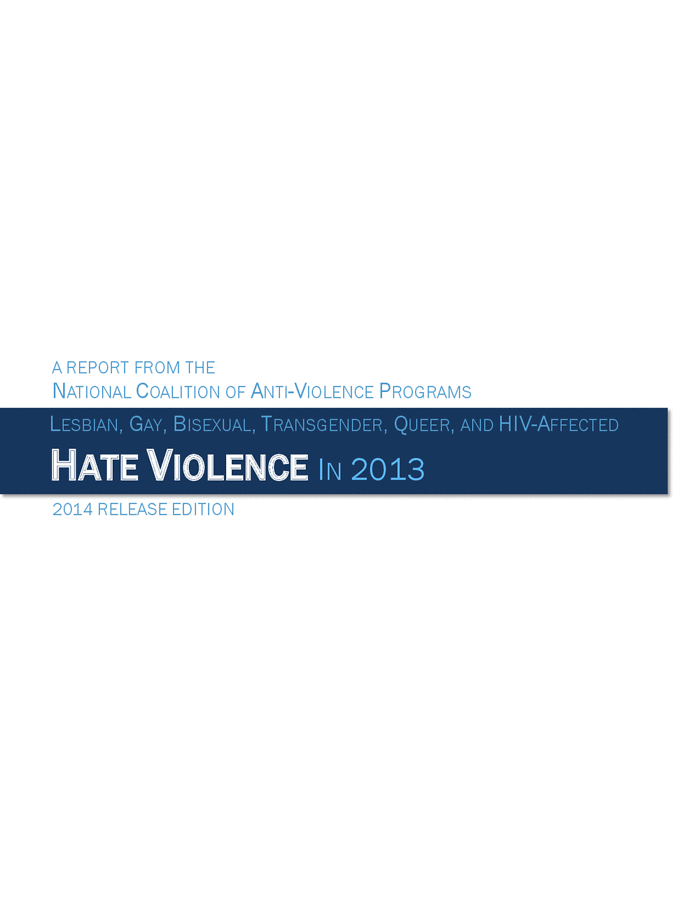
The severity of hate violence perpetrated against LGBT people increased in 2013, according to a new report released Thursday by the National Coalition of Anti-Violence Programs, which details incidents of such violence every year.
While the number of reported incidents of anti-LGBT violence in 2013 was consistent with what was seen in 2012 and there were fewer anti-LGBT homicides, physical hate violence against LGBT people increased by 21% and affected transgender people and people of color at disproportionate rates, according to the report.
"What we found from comparing our 2013 reports to 2012 reports, generally they remain fairly consistent, but what we are concerned about is an increase in severity of the violence in 2013," said Chai Jindasurat, a co-author of the report from New York's Anti-Violence Project.
The transgender community as a whole (transgender women and transgender people of color in particular), along with HIV-affected communities of color, are disproportionately impacted by the hate violence, while gay men make up the largest group of violence survivors. These findings are consistent with data trends the organization has found over multiple years, but in 2013, transgender people — particularly transgender women — people of color, LGBT undocumented people, and gay men saw the most severe violence, the report shows.
Key findings show that undocumented survivors were over three times more likely to experience physical violence, LGBT and HIV-affected people of color were 1.7 times as likely to be injured, and, as a result, twice as likely to require medical attention due to hate violence, among other statistics. These groups are at greater risk of hate violence because they face multiple forms of oppression and discrimination such as racism and citizenship status, according to Aaron Eckhard of the the Buckeye Region Anti-Violence Organization in Ohio.
These groups were also at higher risk of deadly anti-LGBT violence, or homicide, the report found.
Out of the 18 anti-LGBT homicides in 2013 — down from 25 in 2012 — almost 90% of the victims were people of color; specifically, 78% were black and 11% were Latino, while 11% of the homicide victims were white. Almost three-quarters, or 72%, of homicide victims were transgender women, and 67% of homicide victims were transgender women of color. Almost 30% of the homicide victims were gay men.
"Here in New York City alone we saw three hate violence homicides in 2013, an unprecedented number," said Chanel Lopez, hate violence counselor at AVP, in a statement. "Islan Nettles was a transgender woman, Mark Carson identified as a gay man, Ever Orozco was killed because he was perceived to be gay, and all three victims were people of color. These alarming national statistics — and even more so these tragic deaths — can no longer be ignored."
Along with the increase in severity of the violence, the report found a decrease in survivors reporting incidents of violence: 45% in 2013, down from 56% in 2012. Additionally, 32% of those who reported anti-LGBT violence to police said they experienced hostile attitudes from authorities, which is slightly higher than the 27% the organization saw in 2012.
Of those who reported incidents of violence to police, transgender survivors experienced the most physical violence from police; specifically, transgender survivors were seven times more likely to experience physical violence when interacting with the police compared to non-transgender survivors in 2013, according to the report.
The report also points out that 43% of all of the anti-LGBT violence included in the report occurred at private residences.
As a result of the findings, the groups behind the report are calling upon the community, authorities, and policymakers to end the root causes of anti-LGBT violence, which they identify as poverty and anti-LGBT discrimination in public policies, among other recommendations, such as ending police profiling and violence against LGBT people.
Here's a graphic from NCAVP on key findings from the report:


